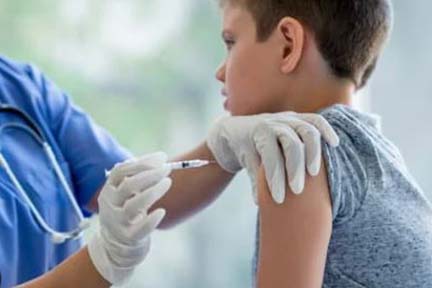
by Becky Andrus | Oct 28, 2021 | Regional News

Gov. Whitmer Signs Directive Limiting State Purchases of Products Containing PFAS
Governor hosts roundtable with residents and community leaders in Oscoda, seeks input on reducing toxic contaminants to keep families safe
LANSING, Mich. — Today, Governor Gretchen Whitmer signed an Executive Directive (ED) to minimize the purchase of products containing PFAS by state government. She also hosted a roundtable with Oscoda residents impacted by toxic contaminants from the decommissioned Wurtsmith Air Force Base.
“PFAS are dangerous, man-made chemicals that pose a threat to our health,” said Governor Gretchen Whitmer. “I’m proud to sign an Executive Directive today that will require the State of Michigan to procure PFAS-free products whenever possible. While this is a good step, we still have so much more to do to address these forever chemicals. We need to lead with science and work together to keep families safe and ensure Michigan continues leading the nation when it comes to protecting people from toxic contaminants.”
“Protecting Michiganders from unnecessary exposure to PFAS chemicals and their risks is the foundation of our state response to find and addresses sources of PFAS contamination,” said Liesl Clark, Director of the Michigan Department of Environment, Great Lakes, and Energy. “Governor Whitmer’s directive is a critical step towards accomplishing that mission by using the state’s purchasing power to move away from harmful products and toward smarter, safer alternatives. EGLE will continue finding ways to protect public health and our natural resources from PFAS and other toxic contaminants.” “It is critical that the products purchased by state government are safe for our residents and employees,” said Jared Ambrosier, Chief Procurement Officer for the Department of Technology Management and Budget. “Putting a priority on products that are free of PFAS when making purchasing decisions will reduce the amount of the dangerous chemical present in Michigan. DTMB is proud to be a national leader in this effort.”
“This is a ground-breaking and important action by Governor Whitmer on behalf of the people of Michigan,” said Tony Spaniola, Co-Chair of the Great Lakes PFAS Action Network. “The Governor’s Executive Directive makes clear that forever chemicals have no place in our bodies or our environment. We urge businesses across Michigan to follow Governor Whitmer’s lead and remove PFAS from the products they sell, not just to state agencies, but to all Michiganders. And we call on the legislature to take immediate action to more broadly limit the sale of products containing PFAS.”
“We are capable of limiting our exposure to these toxic chemicals, and this directive sets important groundwork for substantial change,” said Sen. Winnie Brinks (D-Grand Rapids), whose district has personally been affected by PFAS contamination. “I’m grateful the governor is making this move, and I am committed to continuing the long and hard work necessary in the legislature to hold corporate polluters accountable and bring justice, safety and security to our residents.”
Executive Directive (ED) Actions
The ED will serve to limit the purchase of nonessential products that contain PFAS. The State of Michigan has $2.5 billion worth of purchasing power annually, and the ED directs the Department of Technology, Management, and Budget (DTMB) to purchase PFAS-free products whenever possible. At the state-level, PFAS are primarily found in seating and office furniture, carpets, and sanitary supplies.
To view the full executive directive, click the link below:
Executive Directive 2021-08.pdf
Perfluoroalkyl and polyfluoroalkyl substances (PFAS) are a class of over 4,000 man-made chemicals that have been used in several industry and consumer products worldwide since the 1940s. PFAS have been used in non-stick cookware, fast food packaging, water-repellent jackets, stain-resistant carpets or furniture, cosmetics, and firefighting foams. PFAS are stable chemicals, breaking down slowly in the environment, such that they accumulate over time, and they also are highly soluble, easily transferring through soil to groundwater. As a result, they are persistent in the environment and in the human body. According to the CDC, over 95% of the U.S. population has PFAS in their bodies. While research is ongoing, there is evidence that exposure to PFAS can lead to adverse human health effects. People can be exposed to PFAS in a variety of ways, including working at locations where PFAS are produced or used in manufacturing, through the water they drink or the foods they eat, or when PFAS are released during normal use, biodegradation, or disposal of consumer products containing PFAS.
Whitmer-Gilchrist Administration Actions
Michigan’s proactive and transparent approach to PFAS contamination is widely recognized as a national model for action on PFAS. In 2019, Governor Whitmer issued Executive Order (EO) 2019-3. This EO made the Michigan PFAS Action Response Team (MPART) an established, enduring body and directed MPART to increase citizen engagement, transparency and accountability in the ongoing state efforts to identify PFAS contamination and protect public health.
Since MPART was established the team has sampled all public water supplies throughout Michigan, established some of the nation’s most comprehensive health based regulations limiting 7 PFAS chemicals in drinking water supplies, developed groundwater cleanup criteria for the same 7 PFAS, identified 189 sites to date where one or more of the 7 PFAS compounds exceed standards, removed 51,400 gallons of firefighting foam from Michigan’s fire stations and airport as part of a pickup and disposal program, and so much more.
In addition to MPART’s work, the state has made critical investments to protect our waters. The State of Michigan has invested more in its water infrastructure than the previous five years—from 2014 to 2018—combined. The governor launched the MI Clean Water plan to invest $700 million to build up drinking and wastewater infrastructure while supporting 10,000 good-paying jobs. The plan addresses tackles toxic contaminants like PFAS, high water rates, builds up sewer and septic systems that can’t meet demand, and replaces lead service lines. In addition to MI Clean Water plan, Michigan has invested millions to address PFAS contamination and improve water infrastructure across the state.
The governor also created the Office of the Clean Water Public Advocate to elevate the concerns of residents and investigate complaints related to drinking water and has partnered with Attorney General Nessel to hold PFAS polluters accountable for their contamination. While the State of Michigan has made significant progress on PFAS, additional action remains necessary to protect from the wide-ranging effects of PFAS contamination.
|

by Becky Andrus | Oct 28, 2021 | Health and Wellness
Oakland County: Follow Safe Sleep Practices To Prevent Infant Deaths
Pontiac, Michigan – October is Infant Safe Sleep Awareness Month and the Oakland County Health Division is reminding residents to follow infant safe sleep practices during naps and bedtime. According to the Michigan Department of Health and Human Services, a baby dies every three days from a sleep-related cause in Michigan. Research from the Michigan Public Health Institute shows that 95 infants died due to sleep-related causes in Oakland County from 2010-2019.
“Many of these deaths are attributed to baby sharing the same sleep space with other people and objects in sleeping spaces,” said Leigh-Anne Stafford, director for Oakland County. “Following safe sleep practices can help ensure baby is safer while sleeping.”
Take these steps to help keep baby safe while sleeping:
- Always place baby on their back to sleep
- Use a crib, bassinet, or pack-n-play that meet current safety standards every time during naps and bedtime
- Place baby to sleep alone in their crib, bassinet, or pack-n-play
- Do not place baby to sleep in an adult bed, couch, or chair, with you or alone
- Use a firm mattress with a tight fitted sheet
- Remove all loose bedding, stuffed animals, pillows, and bumper pads from baby’s crib
- Dress baby in sleep clothing appropriate for the indoor temperature
- Keep the room temperature comfortable, do not overheat baby
- Do not smoke or vape around baby
- Remove a sleeping baby from their car seat after arriving to their destination
Examples of sleep-related infant deaths include: suffocation by another person rolling over on baby when sleeping on the same sleep surface, strangulation when blankets wrap around baby’s airway, and choking from baby sleeping on their stomach and spit up going down their air tube.
To review current crib, bassinet and pack-n-play safety standards, visit https://www.cpsc.gov/SafeSleep
To learn if a crib, bassinet or pack-n-play has been recalled, visit www.cpsc.gov/recalls/.
As part of the National Institute of Child Health and Human Development’s Sudden Infant Death Syndrome (SIDS) Awareness Month campaign, Oakland County Health Division encourages caregivers to participate in #SafeSleepSnap on social media. Post a picture on social media of your baby sleeping as recommended by the American Academy of Pediatrics guidelines and tag your post with #SafeSleepSnapOC. With your permission, your photo could be used as part of future safe sleep campaigns.
More information about safe sleep can be found on the Michigan Department of Health and Human Service’s website https://www.michigan.gov/mdhhs/0,5885,7-339-71548_57836—,00.html or by contacting Nurse on Call at 800-848-5533 or [email protected]. Nurse on Call is available 8:30 a.m. to 5:00 p.m., Monday through Friday. For up-to-date public health information, follow @publichealthOC on Facebook and Twitter.
For media inquiries only please contact Bill Mullan, Oakland County media and communications officer, at 248-858-1048.

by Becky Andrus | Oct 28, 2021 | Regional News
Oakland County Gearing Up To Administer Pediatric Doses Of COVID-19 Vaccine
Pontiac, Michigan – In anticipation of the Centers for Disease Control and Prevention (CDC) soon approving emergency use authorization for pediatric doses of COVID-19 vaccine for children ages 5 – 11 years old, the Oakland County Health Division is developing plans to administer pediatric doses as early as sometime in November.
The Health Division is collaborating with local school districts to determine how best to rollout clinics for pediatric doses. Plus, the Health Division has placed preliminary orders for pediatric doses so they will arrive in a timely manner following the CDC’s approval. Oakland County will release details of pediatric COVID-19 vaccine clinics after the CDC approves emergency use authorization for and issues guidance about administering pediatric doses.
“Immunizing residents who remain unvaccinated is vital to limiting the transmission of COVID-19,” Oakland County Health Division Medical Director Dr. Russell Faust said. “The more residents who get the COVID-19 vaccine, the closer we will be to slowing the pandemic to manageable levels.”
More than 276,000 eligible Oakland County residents remain unvaccinated, at least 45,000 of whom are ages 12-19 years old. New cases of COVID-19 continue to grow, especially among unvaccinated residents. Of the more than 4,600 new confirmed and probable cases in Oakland County from October 11-24, residents 39 years old or younger accounted for 53.8 percent of the new cases.
Oakland County Health Division continues to offer first, second, third, and booster doses at community clinics for COVID-19 vaccine. Click on OaklandCountyVaccine.com for addresses, times, and to schedule an appointment. Those who do not have access to the Internet may call the Nurse on Call at 800-848-5533 Monday through Friday, 8:30 a.m. – 5 p.m. for more information. Appointments are strongly encouraged, but walk-ins are welcome.
The flu vaccine is also available at Oakland County’s indoor community clinics. Individuals who schedule their COVID-19 vaccine appointment at an indoor clinic will be asked to indicate whether they would like to receive the flu vaccine. Residents may also request it at the time they show up to get their COVID-19 vaccine at an Oakland County indoor clinic. The flu vaccine is unavailable at drive-through clinics.
The following is an update on progress vaccinating Oakland County residents, according to the State of Michigan COVID-19 Vaccine Dashboard as of October 26, 2021:
Total eligible residents 12 and older: 1,091,389
- Number of residents 12 and older who have received first dose: 814,702
- Number of residents 12 years and older who have completed vaccination: 758,148
- Vaccine coverage for residents 12 and older: 76 percent
Total eligible residents 16 and older: 1,029,737
- Number of residents 16 and older who have received first dose: 779,236
- Number of residents 16 and older who have completed vaccination: 725,612
- Vaccine coverage for residents 16 and older: 75.7 percent
Total eligible senior residents 65 and older: 217,676
- Number of senior residents who have received first dose: 194,258
- Number of senior residents who have completed vaccination: 182,830
- Vaccine coverage for senior residents: 82 percent
Total doses distributed within Oakland County: 1,733,945
Total primary series doses administered within Oakland County: 1,513,495
Total third and booster doses administered in Oakland County: 86,660

by Becky Andrus | Oct 28, 2021 | Health and Wellness
Press Release
FOR IMMEDIATE RELEASE: Oct. 28, 2021
CONTACT: Chelsea Wuth, 517-241-2112, [email protected]
MDHHS issues RFP for senior center wellness program
LANSING, Mich. – The Michigan Department of Health and Human Services (MDHHS) has issued a Request for Proposals (RFP) for Senior Center Wellness Program.
Eligible applicants are multipurpose senior citizen centers located within the state of Michigan. Private housing facilities with senior activity programs are not eligible.
The focus of the Senior Citizen Wellness Program is to support health-related senior programs at multipurpose senior citizen centers. The programs funded through this grant should include mental and physical health maintenance and improvement for senior participants.
Proposed work must fall within one of the following areas: physical activity, nutrition, chronic illness and self-management, depression, social isolation, fall prevention, caregiver education and burnout prevention, medication management, and pandemic/epidemic (COVID-19) education and information. Applicants may submit more than one application, but MDHHS will award no more than $5,000 per applicant for a program area.
MDHHS will prioritize applications that demonstrate incorporation of evidence-based health promotion and disease prevention programs that include matching funding and are from applicants who submit multiple applications requesting funding across multiple program areas.
The award period begins Feb. 1, 2022, and ends Sept. 30, 2022. MDHHS expects to award approximately $150,000 to fund approximately 30 projects.
Grant applications must be submitted electronically through the EGrAMS program by 3 p.m. on Nov. 30.
For more information or to apply, visit the EGrAMS website and click the “About EGrAMS” link on the left panel to access the “Competitive Application Instructions” training manual. The complete Request for Proposal document can be accessed on the EGrAMS website.

by Becky Andrus | Oct 27, 2021 | Regional News
Elections to be held in 71 counties Nov. 2
Voters reminded to cast ballots
School districts and communities in 71 counties will hold elections Nov. 2. Check this by county list to see if yours is one of them.
The polls will be open statewide from 7 a.m. to 8 p.m.
Check your registration status at the Michigan Voter Information Center at Michigan.gov/Vote.
 The Secretary of State encourages voters who already have a ballot at home to fill it out and sign the back of the envelope. Voters should deliver it to their local clerk’s secure ballot drop box if they have one, or to the clerk’s office if possible, to avoid possible U.S. Postal Service delays. The Secretary of State encourages voters who already have a ballot at home to fill it out and sign the back of the envelope. Voters should deliver it to their local clerk’s secure ballot drop box if they have one, or to the clerk’s office if possible, to avoid possible U.S. Postal Service delays.
In-person voting will be available in every jurisdiction for voters who choose to do so. |
Voting and returning an absentee ballot
You have until 8 p.m. on Election Day to complete your ballot and return it to the clerk’s office or drop box. Your ballot will not be counted unless your signature is on the outside of the return envelope and matches your signature on file.
If you’re already registered at your current address, you can request an absent voter ballot in person at your clerk’s office anytime up to 4 p.m. on the day prior to the election (Nov. 1).
In-person voting
Beginning 40 days prior to Election Day, voters have the option of voting early using an absentee ballot in their clerk’s office until 4 p.m. on the day before the election.
Polling places will be open in every jurisdiction on Election Day for voters who want to vote in person. Voters are not required to wear a mask while at the polls.
Each polling location will have at least one voting station adapted to allow a person to vote while seated. In addition, all voters, including voters with disabilities, have access to a Voter Assist Terminal in all polling places. The Voter Assist Terminal helps the voter mark a ballot. It will mark the ballot with the voter’s choices but does not tally the votes. Once the ballot is marked, it is counted in exactly the same fashion as all other ballots.
You can register to vote through Election Day
Citizens who are not yet registered to vote but who wish to do so in the Nov. 2 election may do so at the office of their local clerk up until 8 p.m. on Election Day. You can find your clerk’s information at Michigan.gov/Vote.
Proof of residency must be provided if registering within two weeks of an election. Acceptable documents include a driver’s license, state ID card, current utility bill, bank statement, paycheck, government check or other government document. Documents must have name and current address. Digital copies are acceptable.
Be democracy’s MVP:
Sign up to be an election worker today!
Election workers are the Most Valuable Players of our democracy, ensuring free and fair elections for all. And our democracy needs election workers more than ever. Serving as an election worker is a paid position, and all election workers are trained on proper protocols to assist clerks and count ballots.
Interested voters can sign up at Michigan.gov/DemocracyMVP.
|
|









 The Secretary of State encourages voters who already have a ballot at home to fill it out and sign the back of the envelope. Voters should deliver it to their local clerk’s secure ballot drop box if they have one, or to the clerk’s office if possible, to avoid possible U.S. Postal Service delays.
The Secretary of State encourages voters who already have a ballot at home to fill it out and sign the back of the envelope. Voters should deliver it to their local clerk’s secure ballot drop box if they have one, or to the clerk’s office if possible, to avoid possible U.S. Postal Service delays.
